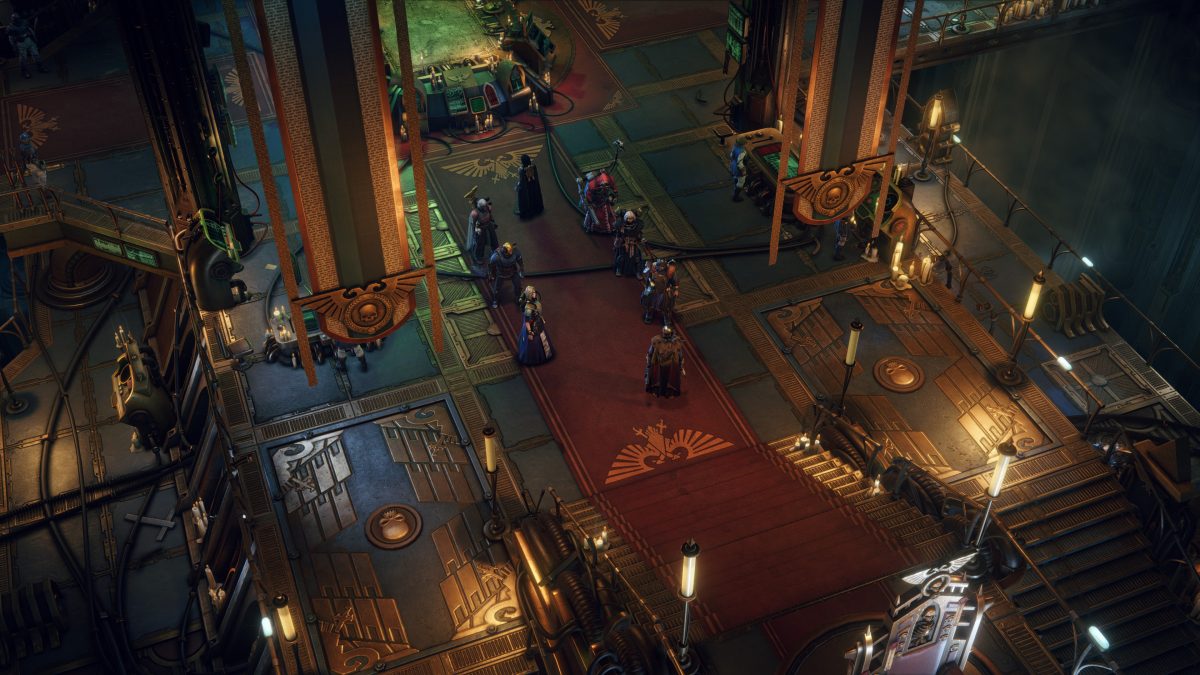I was shuttling up to my Voidship, planning to check out a prison planet uprising, when the sun exploded. The unexpected arrival of Xenos ships and the quick deployment of their star-shattering weapon left my crew in complete disarray. As I met with a round table of companions and ship staff, I was presented with choices.
With the collapsing force of the star and the growing instability brought on by the Warp, evacuations were ill-advised. Still, I could try to save the nearby planet’s population, but allies noted that the Warp had likely corrupted them. Alternatively, a member of the Adeptus Mechanicus asked if I’d consider diverting resources to save a piece of sacred machinery. Others at the meeting demanded we high-tail it out of the system as fast as possible.
I made what I thought was the best decision at the time, opting to save as many people as possible. But soon after arriving in a new system, commanders among my crew alerted me that evidence of the Warp’s stain was present within my ship. Amazed by what had transpired over the last ten minutes, I realized I had only just exited the tutorial-like starting area of Warhammer 40000: Rogue Trader.
Where Warhammer 40K games typically falter
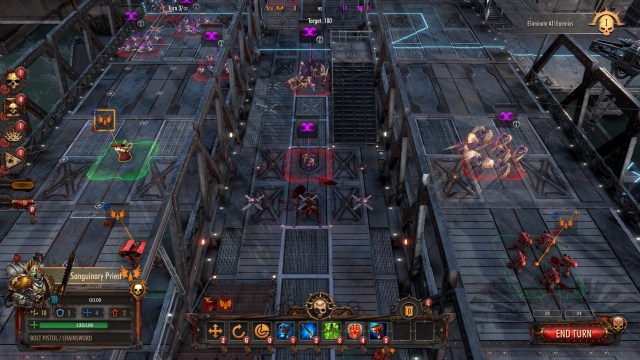
There are certainly examples of great Warhammer 40K games, like Dawn of War 2 or Space Marine. But I contend that even these top-shelf offerings stumble when trying to present the universe as a whole. I’ve talked about this before. It was the crux of my argument that Destiny 2 is a better Warhammer 40K game than most legitimately licensed options. In almost every Warhammer 40K game I’ve played, you’re either an eye in the sky commanding vast forces or a specific individual within some lore niche.
Both avenues present their inherent problems. Strategy games lose ambiance and personality among endless menus and a POV quite literally removed from the eye level we humans identify with. The other category, usually action titles, is often too engrossed with a singular conflict. For example, in Space Hulk: Deathwing, you’re exclusively Space Marines fighting through space hulks. In Darktide, you’re exclusively a band of miscreants fighting through a hive city. Even in Space Marine, you’re exclusively one faction of Space Marines doing the same thing over and over again.
Warhammer 40K games, as a whole, lack the breakaway world-building and character development that really sells a setting. For the most part, a lot of the games in the franchise can feel a little one-note. However, thankfully, that’s not the case with Rogue Trader.
Capturing the heart and soul
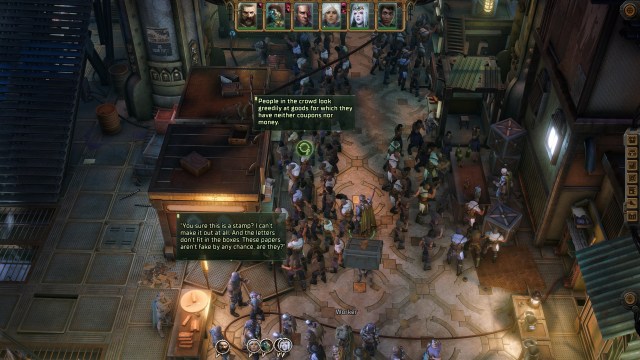
Whatever other Warhammer 40K games lack in world-building, Rogue Trader makes up for it in spades. From the soundtrack to the dialogue to the little things like background NPC chatter and optional environment interactions, Rogue Trader steeps you in the Warhammer 40K universe. While this would almost certainly be impenetrable for those unfamiliar with the IP, Owlcat Games implemented a handy encyclopedia. It even highlights Warhammer 40K-specific words and phrases as they come up.
It’s not just about the fully explorable, living and breathing Warhammer 40K universe to explore; it’s how players can interact with it. Every area of the game I’ve explored is teeming with non-essential characters to speak with and scenery to examine. Sometimes, this leads to side quests or activities, like pretending to be the inheritor of a feared space pirate’s will. Other times, it just adds some flavor and context. While it’s not on the same level as an RPG like Bauldur’s Gate 3, it’s a commendable effort and a first for Warhammer 40K games.
Choices, choices
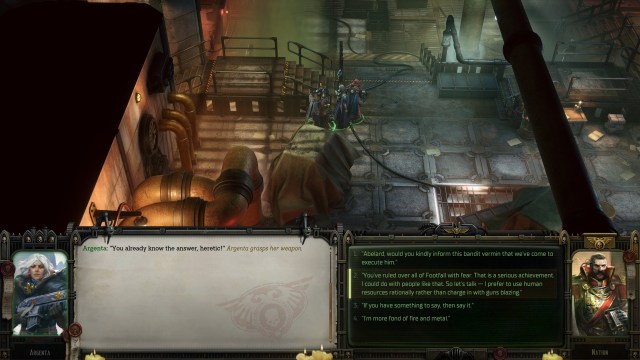
Underscoring the whole experience is the fact that Rogue Trader celebrates player choice. I consider this very important, as not everyone wants to engage with the Warhammer 40K universe the same way. I can’t even count the number of friends I’ve tried to get into the franchise. Most were turned off by lore overload or because they couldn’t find characters or factions they aligned with. Both are non-issues in Rogue Trader, as players mostly control their own story.
There are several ways to roll through the game by the grace of the God Emperor, as most fans would anticipate for the Imperium-aligned Rogue Traders. There’s also plenty of opportunity to go against the grain, be that through indifference or heretical design. Perhaps what’s most appreciated is that every once in a while, Rogue Trader lets players react as an average person would to its bizarre, bleak universe.
Player agency doesn’t end there. It’s built into almost every part of Rogue Trader. Of course, there are still a few situations that have to happen a certain way to move the narrative forward. But by and large, it’s possible to overcome story obstacles in whichever way players want. Tired of “good” crewmates talking your ear off every time you do something they don’t like? Replace them with like-minded individuals. It’s easy enough to play through the game how players want, surrounded by the party they want.
Customization worthy of a Rogue Trader
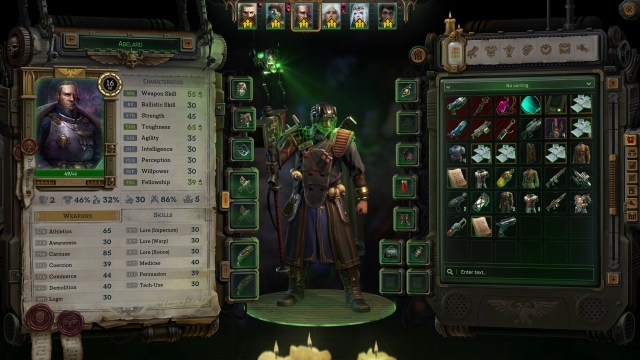
What would a Warhammer 40K game be without its armory? This is another area where Rogue Trader doesn’t disappoint. Many notable heavy-hitters are available, including chainswords, bolters, laser weapons, plasma weapons, and power weapons. And that’s just scratching the surface. The sheer amount of options is both impressive and exactly what I’d hope to find in a Warhammer 40K title. It’s a sci-fi universe totally consumed by weaponry and war; I expect some variety with how I can kill.
Much of the same praise goes to the wearable gear. There are armor options from across the whole franchise and plenty of digital rings and other Warhammer 40K accessories. Then there’s the Voidship. Friends, I kid you not; I squealed with glee when I discovered it could also be customized. I haven’t made it far enough to really engage with the system beyond a single space battle, but the prospect has me excited.
Capping things off, Owlcat has a deep and highly customizable progression system in place. Characters adopt Archetypes as they level up, and these offer a wide assortment of abilities, passive bonuses, and gear proficiencies. Even if two characters end up with the same Archetype, there’s enough skill variety to create several functionally different characters. Once a character reaches a certain level, they can take another, more specialized, Archetype to add further options.
I haven’t quite been able to pull myself away from Rogue Trader since I started. Between the compelling narrative, player agency, and precisely crafted atmosphere, it’s on track to become my favorite Warhammer 40K game. If another certain Dungeons & Dragons threequel didn’t come out in 2023, it might have even been my favorite RPG of the year. That said, I’ve only just scratched the 20-hour mark, and I’ve got an inherited space dynasty to return to.


